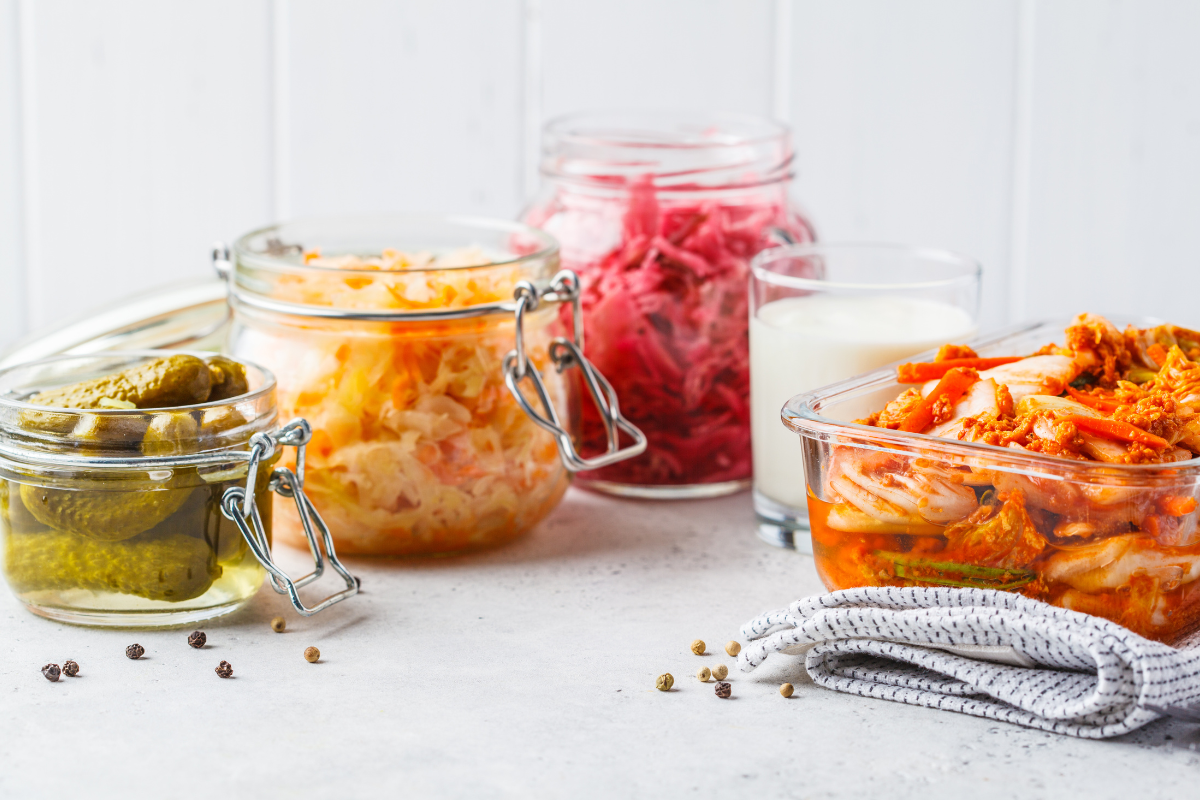Key Points:
- Unsurprisingly, the worst foods for gut health are usually the most heavily processed ones. As we nurture our microbiome, it’s important to prioritise a diet of whole and nutrient-dense foods that provide us with the tools we need to fuel our gut ecosystems.
- People with gut dysbiosis should recognise that some healthy foods (high FODMAP foods and fibre, for example) might temporarily be problematic as they work to rebuild gut health. In this case, permit yourself to do what you can and take recovery slowly.
- Replace the worst foods for your gut with the best foods. Our rule of thumb is to always find the freshest and least processed foods available (yes, this even includes raw dairy).

Hippocrates famously said, “All disease begins in the gut.”
Over two thousand years later, we’re only just catching onto his ancient wisdom.
The gut is home to an entire ecosystem of bacteria, yeast, fungi and other microbes. When in perfect balance, this ecosystem tackles so much more than just digestion.
You can thank your gut for…
- Blood sugar balance
- Immune system regulation
- Serotonin production
- Nutrient metabolism and absorption
- Nervous system health
- Mood stability
- Weight management
… and many more benefits that science is still working to uncover. This is why it’s so important to evaluate the foods we eat regularly — and how they could positively or negatively impact our gut health.
Let’s explore the six worst foods for gut health (and what to eat instead).
6 Worst Foods for Gut Health
People with a sensitive gut know all too well that some foods are better for the digestive system than others. Let’s unpack some of the worst foods for gut health (particularly, the microbiome) and find some better alternatives.
1. Chemically Processed, Heated Seed Oils
When produced responsibly, seed oils aren’t bad for you. Cold-pressed and consumed in the correct ratio for cellular health (4:1 omega-6 to omega-3), essential fatty acids from seed oils contribute to both delicious meals and good health.
The problem is that most modern diets include staggering amounts of chemically processed and rancid seed oils, which are packed into fried foods, salad dressings, baked goods, chips, packaged snacks, and more. These seed oils are processed using high heat (which turns them rancid and removes nutrients) and chemical hexane.
Seed oils are cheap to produce and often used as fillers in otherwise healthy foods. As they’ve grown in popularity, we’ve quickly started consuming them beyond healthy limits. So much exposure to omega-6 fatty acids can upset the delicate balance of omega-6 to omega-3 and trigger the inflammatory response.
2. Artificial Sweeteners
Anything that enters the gut can alter the gut microbiome — for better or worse. Highly processed foods that include artificial sweeteners are in the spotlight at the moment.
One study looked at the impact of common artificial sweeteners (aspartame and sucralose) on the gut microbiome — and the results were surprising. These sugar substitutes were shown to alter gene expression in bacterial metabolism. Essentially, this turns genes “on” or “off” and can even instruct them to malfunction. Artificial sweeteners also have the ability to reduce healthy strains of bacteria and slow glucose metabolism (yikes).
3. Processed Sugar
It’s common knowledge that excess sugar consumption can negatively impact the immune system. But now that we know more about the gut microbiome, we have a better understanding of why this occurs.
Regular sugar consumption can disrupt the gut microbiome — encouraging the growth of pathogenic (unhealthy) bacteria and fungi. This can exacerbate common microbial issues like candida overgrowth. The microbiome acts as part of the immune system, with healthy bacteria regularly communicating with immune cells. So, a lack of microbiome diversity and an influx of pathogenic bacteria directly impact our immune system function.
4. Carrageenan
Carrageenan is an emulsifier commonly found in foods like yogurt, plant-based milk, baked goods, mayonnaise, sauces, and even powdered baby formula. It is used to blend water and oil without allowing separation or to “fill space” in a product, making it cheaper for the manufacturer to produce.
According to studies, though, carrageenan can have a profound impact on the gut. One stated that “clinical evidence suggests that [carrageenan] is involved in the pathogenesis and clinical management of inflammatory bowel diseases (IBD),” and it can “activate the innate immune pathways of inflammation, alter the gut microbiota composition, and decrease the thickness of the mucus barrier.” Exactly the opposite of what we want for a healthy gut. The study recommends eliminating or reducing processed foods containing carrageenan as much as possible.
5. High FODMAP Foods
Let’s make one thing clear: High FODMAP foods aren’t inherently bad. But they can aggravate gut symptoms in some people.
High FODMAP foods include some fruits, grains, lactose-containing dairy, legumes, onions, garlic, and select vegetables. The concern with high FODMAP foods is that they’re digested by the microbiome.
For people with low diversity in their gut, this could become a problem. High FODMAP foods are often triggers for people with gut dysbiosis and irritable bowel syndrome (IBS) since they ferment in the gut and can take a long time for the microbiome to digest.
If you notice that these foods are hard on your digestive system (causing symptoms like pain, gas, bloating, or diarrhea), you might benefit from a temporary low FODMAP diet.
6. Glyphosate
Glyphosate isn’t technically a food — it’s an herbicide — and it’s the most commonly used one in the world. A recent review from the Environmental Working Group found glyphosate contamination in more than ninety-five percent of oat products. But it’s also prevalent in wheat.
The problem with glyphosate is that it acts as an antifungal. So, when consumed (even at low doses but for a long period of time), it can fundamentally change the ecosystem in our gut. One study showed that more than half of the human microbiome was impacted by glyphosate exposure. The same study noted that a healthy microbiome could build up resistance to glyphosate, changing the entire gut ecosystem in the process (and not for the better).
Bonus: Some Pharmaceuticals and Other Medications
While prescription and over-the-counter medications have their place, it’s important to recognise their influence on the microbiome. Antibiotics should be used sparingly and only when truly necessary. Other popular medications like birth control, NSAIDs, SSRIs, and PPIs have all been shown to impact the fragile gut ecosystem. In a unique study, frequent use of laxatives was considered a predictor of reduced microbiome diversity in the gut.
What to Eat Instead: 6 Best Foods for Gut Health
Want to know what to eat instead of these for better gut health? Below are healthy foods help to feed the gut microbiome — welcoming a diversity of bacteria strains and promoting the good bacteria already colonized in your gut.
1. Probiotics
Some foods contain live and active bacterial strains that can colonize the gut (enter, probiotics). Probiotic-rich foods are arguably the best way to increase your gut microbiome and diversity (yes, even better than probiotic supplements).
Probiotic Foods:
- Yogurt
- Kimchi
- Kombucha
- Some raw dairy products
- Kefir
- Sauerkraut
2. Amino Acids
Glycine (found in bone broth) is a powerful amino acid that helps reduce the inflammatory response in the gut. It’s incredibly soothing for people who experience regular gut dysbiosis. Other dietary amino acids, like glutamine and proline, also help create a strong gut lining.
Amino Acid Foods:
- Grass-fed beef
- Grass-fed organ meats
- Eggs
- Raw dairy
- Bone broth
- Collagen
- Bone marrow
3. Resistant Starch
While resistant starch has gained a bad reputation over the years, this food is a powerful fuel for butyrate production. Just a word to the wise: start eating them slowly if you’re not used to resistant starch.
Resistant Starch Foods:
- Legumes
- Under-ripe bananas
- Plantains
- Cooked and cooled potatoes
- Cooked and cooled rice
4. Grass-Fed Beef Liver
Nutrient deficiencies can be a huge driving factor when it comes to poor gut health. Some studies have linked vitamin D deficiency to IBS. Even if a vitamin or mineral deficiency isn’t the driving force behind your gut issues, it can be helpful to add beef liver as a super-nutrient to help replenish your body. Low nutrient absorption is likely present if you experience regular loose stools.
Easy Ways to Eat Grass-Fed Beef Liver:
- Make a beef liver pate
- Buy ground beef with beef liver mixed in
- Take beef liver capsules
- Hide it in dishes like lasagna, meatloaf, and chilli
5. Raw or Low-Temperature Pasteurised Dairy
For people who are sensitive to dairy, this recommendation might seem counterintuitive. But here’s the thing: dairy is one of the most nutrient-dense foods on the planet. When unpasteurised, it contains healthy enzymes, minerals, amino acids, probiotics, almost all the fat-soluble vitamins, and protein.
Most people who struggle to digest regular dairy find raw dairy much easier on their stomachs. Dairy with A2 protein is helpful for this, too.
Raw dairy does come with some risks, and it’s important to talk to your farmer and ensure you’re getting a safe product. If you’re worried about consuming raw milk, you can try low-temperature pasteurized milk instead.
Raw Dairy Foods:
- Milk
- Cheese
- Milk kefir
- Sour cream
- Cottage cheese
- Yogurt
6. Farm Fresh Vegetables
It’s so important to know where your food comes from. Local farm fresh vegetables are typically easier to digest than store-bought (yes, even if it’s the same vegetable). The food transportation process usually requires the use of more chemicals for packaging and preservation.
Plus, you can ask local farmers exactly how they grow their crops. Vegetable crops that are rotated regularly to areas with fresh soil should have more vitamins and minerals in them. Plus, farms that use cover crops are less likely to deplete their soil of nutrients.
Farm Fresh Vegetable Tips:
- Eat what’s in season
- Eat organic vegetables
- Ask about crop rotation
- Ask about cover crops
- Ask about chemicals and pesticides
Cultivate Healthy Gut Bacteria While You Change Your Diet
For people struggling with gut dysbiosis, it can be difficult to curb cravings and eat nutrient-dense foods. Yeast, parasites, and bacteria can change the way you eat and affect even the most strong-willed person.
This is why we recommend addressing your gut dysbiosis from all angles. Food, supplements, calming of the nervous system — you name it.
One of our favourite supplements for gut health is Butyrate. This is a short-chain fatty acid that’s produced in the body by a healthy gut. It does amazing things like fuel the gut lining, support blood sugar balance (promoting GLP-1), and improve brain health.
For your body to produce butyrate, it needs a healthy microbiome and a balanced diet that includes resistant starch. This is a tall order for those experiencing gut symptoms.
That’s what makes butyrate supplementation so powerful. You can empower your body with tools for healing while giving it the time and space required for recovery.
- Butler, M. I., Bastiaanssen, T. F. S., Long-Smith, C., Berding, K., Morkl, S., Cusack, A. M., Strain, C., Busca, K., Porteous-Allen, P., Claesson, M. J., Stanton, C., Cryan, J. F., Allen, D., & Dinan, T. G. (2020). Recipe for a Healthy Gut: Intake of Unpasteurised Milk Is Associated with Increased Lactobacillus Abundance in the Human Gut Microbiome. Nutrients, 12(5), 1468. https://doi.org/10.3390/nu12051468
- Conz, A., Salmona, M., & Diomede, L. (2023). Effect of Non-Nutritive Sweeteners on the Gut Microbiota. Nutrients, 15(8), 1869. https://doi.org/10.3390/nu15081869
- Korach-Rechtman H, Rom O, Mazouz L, et al. (2020). Soybean oil modulates the gut microbiota associated with atherogenic biomarkers. Microorganisms, 8(4), 486. https://doi.org/10.3390/microorganisms8040486
- Naimi, S., Viennois, E., Gewirtz, A.T., et al. (2021). Direct impact of commonly used dietary emulsifiers on human gut microbiota. Microbiome, 9(1), 66. https://doi.org/10.1186/s40168-020-00996-6
- Puigbò, P., Leino, L. I., Rainio, M. J., Saikkonen, K., Saloniemi, I., & Helander, M. (2022). Does Glyphosate Affect the Human Microbiota?. Life (Basel, Switzerland), 12(5), 707. https://doi.org/10.3390/life12050707
Share:
Related Posts

Goodbye Pie Chart, Hello Phase 1 Sliders
Written by Allison Smith, ND | 2025 As we usher in a new era of DUTCH testing which leaves behind the concept of the three-way

Introducing the DUTCH Dozen
Written by Kelly Ruef, ND | 2025 Hormone testing can be complex, which is why Precision Analytical developed the DUTCH Dozen, an interpretive framework that

DUTCH Report Enhancements
Written by Hilary Miller, ND | 2025 Precision Analytical have released the newest version of the DUTCH Test. This is the report’s most significant update

Gallbladder Health 101: What It Does and How to Keep It Working Well
Written by Ashley Palmer & Pooja Mahtani | 2025 The gallbladder may not get much attention compared to the gut, but it plays a central

Can You Bring Vitamins on a Plane? How To Travel with Supplements
Written by Austin Ruff | 2024 Are you traveling for a work conference, an athletic competition, or a weekend getaway? Just because you’re leaving home

